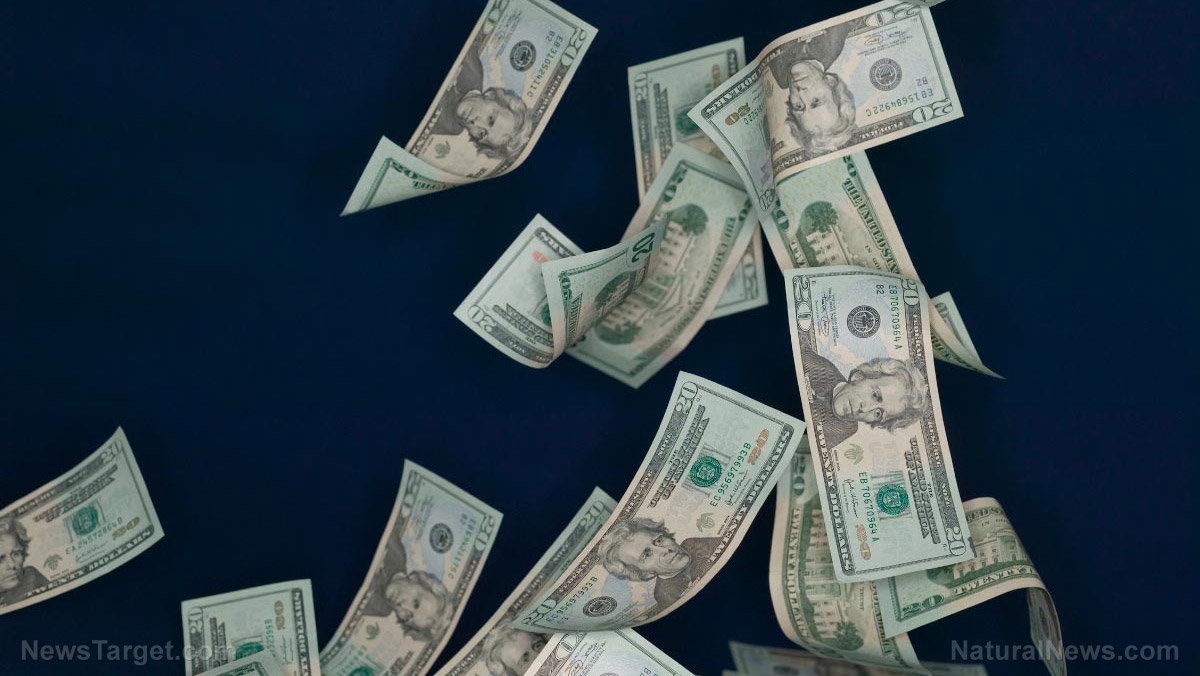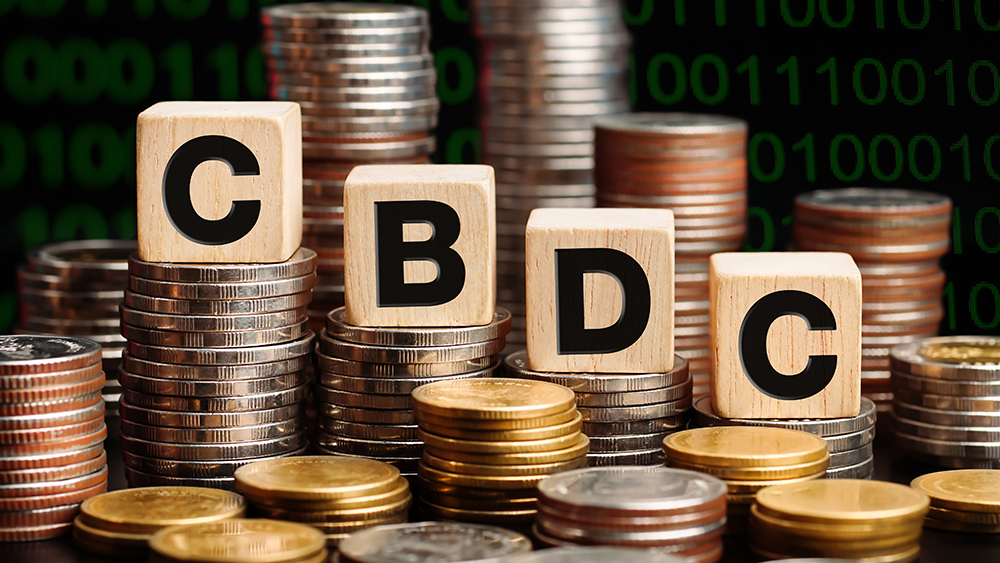Everything you need to know about BlackRock, the company that owns the world
04/24/2023 / By News Editors

BlackRock is one of the most powerful organizations in the world, and its nefarious role in global economics and politics is becoming more apparent.
(Article by Andreas Wailzer republished from LifeSiteNews.com)
The investment giant is pushing woke politics in the form of corporate social credit scores (ESG), which includes the dangerous “net zero” and LGBT agenda. BlackRock is also responsible for rigging the financial systems and has control over a significant portion of the world’s wealth.
In order to fight back, we need to know what we are dealing with. In this article, we take a deep dive into the history, current business practices, and plans of the globalist behemoth known as BlackRock.
The history of BlackRock and its founder
As of early 2022, BlackRock Inc. had around $10 trillion in assets under its management, making it the largest asset manager in the world. Blackrock holds a significant number of shares in most of the largest corporations in the world, including Amazon, Apple, Microsoft, Google, Tesla, Coca-Cola, Moderna, Johnson & Johnson, Exxon Mobil, Visa, Chevron, JPMorgan Chase, Walmart, and many more.
The company was founded 35 years ago, in 1988, by investment banker and current CEO Larry Fink as an affiliate organization of Blackstone Inc. It was originally named Blackstone Financial Management and grew rapidly within the first four years of its existence, reaching a portfolio of $17 billion by 1992, journalist James Corbett reported.
Since BlackRock had grown into a very respectable business, Fink and Stephen Schwarzman, the CEO of Blackstone, decided to separate BlackRock from Blackstone and make it into its own venture.
BlackRock went public in 1999 for $14 a share; the firm managed $165 billion in assets at this point. In the early 2000s, the company expanded its business to include analytics and risk management. It bought the investment management company State Street Research & Management in 2004, merged with the investment management firm Merrill Lynch in 2006, and acquired the Quellos Group’s key asset-management unit in 2007, bringing BlackRock’s total asset value under management to over $1 trillion.
While the financial success of BlackRock may seem impressive up until this point, what really turned the firm into the global financial dominator it is today was the financial crisis of 2007 and 2008. Journalist Heike Buchter, who wrote a book on BlackRock, said in 2015, “Prior to the financial crisis I was not even familiar with the name. But in the years after the Lehman [Brothers] collapse [in 2008], BlackRock appeared everywhere. Everywhere!”
Many banks, including Lehman Brothers, as well as the U.S. government and the Federal Reserve turned to Fink and BlackRock for help to sort out the complicated financial instruments that had led to the crisis and to assist with the 2008 bailouts.
Fink was trusted by these institutions as an expert on the financial instruments that led to the sub-prime mortgage crisis because he helped to create the toxic mortgage industry. In the 1980s, when Fink was still working for the investment bank First Boston, he constructed “his first Collateralized Mortgage Obligation (CMO) and almost single-handedly” created “the sub-prime mortgage market that would fail so spectacularly in 2008,” Corbett wrote.
“When the dust finally settled on Wall Street after the Lehman Brothers collapse, there was little doubt who was sitting on top of the dust pile: BlackRock,” Corbett said.
Under Fink’s leadership, BlackRock used its financial power and influence to move into national and international politics. Author and economic journalist F. William Endgahl put it this way:
BlackRock founder and CEO Larry Fink is clearly interested in buying influence globally. He made former German CDU MP Friederich Merz head of BlackRock Germany when it looked as if he might succeed Chancellor Merkel, and former British Chancellor of Exchequer George Osborne as ‘political consultant.’ Fink named former Hillary Clinton Chief of Staff Cheryl Mills to the BlackRock board when it seemed certain Hillary would soon be in the White House.
He has named former central bankers to his board and gone on to secure lucrative contracts with their former institutions. Stanley Fisher, former head of the Bank of Israel and also later Vice Chairman of the Federal Reserve, is now Senior Adviser at BlackRock. Philipp Hildebrand, former Swiss National Bank president, is vice chairman at BlackRock, where he oversees the BlackRock Investment Institute. Jean Boivin, the former deputy governor of the Bank of Canada, is the global head of research at BlackRock’s investment institute.
You can clearly see the entanglement between BlackRock and the highest levels of politics and business and the immense global influence Fink’s investment firm therefore possesses. The corporation became so powerful that Professor William Birdthistle called it the “fourth branch of government.”
BlackRock in cahoots with the Biden administration
In 2019, when Joe Biden contemplated running for President against Donald Trump, the former vice president met with Fink to ask for BlackRock’s support. The CEO reportedly told Biden that “I’m here to help.”
Biden, seemingly quick to compensate BlackRock for its help, appointed Brian Deese as director of the National Economic Council soon after he became President. Before that, Deese was BlackRock’s Head of Sustainable Investing from 2017 until 2020. He also held several key positions in the Obama administration, including senior adviser to the president.
Another former BlackRock employee in the current Biden administration is Deputy Treasury Secretary Adewale Adeyemo, who served as senior adviser to Fink from 2017 until 2019. The Nigerian-born politician also has close ties to former President Barack Obama; he was chosen to be the first president of the Obama Foundation in 2019.
Moreover, former global chief investment strategist at BlackRock, Michael Pyle, is now the senior economic adviser to Vice President Kamala Harris. Pyle also served as a senior adviser to the Undersecretary of the Treasury for International Affairs in the Obama administration.
One may say that the Biden administration’s economic policy is essentially run by BlackRock.
BlackRock’s key role in the Great Reset and the COVID ‘pandemic’
Corbett argues that the COVID-19 “pandemic” was not mainly about a virus but rather represented an opportunity for global elites, particularly BlackRock, to reshape the global economy and the financial system.
On August 22, 2019, Fink officially joined forces with Klaus Schwab’s globalist World Economic Forum (WEF) when he became a member of the WEF’s Board of Trustees. On the same day, a meeting began of central bankers, economists, and policymakers to discuss economic policy – the annual Jackson Hole Economic Symposium – where BlackRock kicked off its financial revolution.
One week before the event, BlackRock published a paper that would set the parameters of the discussion at the symposium in Jackson Hole, Wyoming.
“After years of quantitative easing (QE) and ZIRP (zero interest rate policy) and even the once-unthinkable NIRP (negative interest rate policy), the banksters were running out of room to operate,” Corbett explained.
So, the financial elites needed something new and BlackRock provided them with an answer: “Going direct.”
In order to understand the concept, one must first know that the monetary system is split into two circuits: the retail circuit and the wholesale circuit. The retail circuit is where “bank money” is spent, i.e. the money that regular people and businesses spent to transact in the economy. Then there is “reserve money” (wholesale circuit) which are the deposits that banks keep at central banks, like the Federal Reserve (Fed) or the European Central Bank (ECB).
For a more detailed explanation of the two monetary circuits, you can read my article on Central Bank Digital Currencies.
BlackRock’s proposal of “going direct” meant bypassing the split monetary system and letting central banks directly pump money into various private and public entities.
“An unprecedented response is needed when monetary policy is exhausted and fiscal policy alone is not enough,” BlackRock’s August 2019 paper stated. “That response will likely involve ‘going direct’: Going direct means the central bank finding ways to get central bank money directly in the hands of public and private sector spenders.”
In September 2019, months before the so-called “pandemic” began, Federal Reserve money started to be directly pumped into the retail monetary circuit.
Once the federal bailouts began with the first lockdowns in March 2020, the “going direct” system had already been put in place and the Fed could directly put money into private and public organizations.
“What we were told was a ‘pandemic’ was in fact, on the financial level, just an excuse for an absolutely unprecedented pumping of trillions of dollars from the Fed directly into the economy,” Corbett wrote.
In March 2020, similar to the financial crisis in 2007–2008, the Fed turned to BlackRock to manage its bailout programs.
This allowed BlackRock to get access to government, i.e. taxpayer, money, and distribute it to corporations that BlackRock was invested in and it enabled BlackRock to bail out one of its most important assets: iShares, the exchange traded funds (ETFs) collection, which as of January 2023 had $2.23 trillion worth of assets under management.
This means that BlackRock was allowed by the Fed to use taxpayer money to bail out its own assets. Russ and Pam Martens put it like this in their blog piece:
No bid contracts and buying up your own products, what could possibly be wrong with that? To make matters even more egregious, the stimulus bill known as the CARES Act set aside $454 billion of taxpayers’ money to eat the losses in the bail out programs set up by the Fed. A total of $75 billion has been allocated to eat losses in the corporate bond-buying programs being managed by BlackRock. Since BlackRock is allowed to buy up its own ETFs, this means that taxpayers will be eating losses that might otherwise accrue to billionaire Larry Fink’s company and investors.
In addition to the Fed, the Bank of Canada and the Swedish central bank also consulted BlackRock to help manage their corporate bond buying program.
With its 2020 “going direct” coup d’état, “BlackRock had truly conquered the planet,” Corbett wrote.
“It was now dictating central bank interventions and then acting in every conceivable role and in direct violation of conflict-of-interest rules, acting as consultant and advisor, as manager, as buyer, as seller and as investor with both the Fed and the very banks, corporations, pension funds and other entities it was bailing out.”
BlackRock’s all-powerful IT system
A significant portion of the value of all stocks and bonds in the world is managed through BlackRock’s “central processing system for investment management.”
This system, called Aladdin (abbreviation for “asset, liability, debt and derivative investment network”), is not only used by BlackRock itself.
BlackRock Solutions, one of BlackRock’s subsidiaries, licenses Aladdin to over 150 institutions, including the second largest asset manager in the world, Vanguard, and another giant of the industry: State Street Global Advisors. The system is also used by many of biggest insurance companies in the world and Big Tech firms such as Alphabet (Google), Apple, and Microsoft, as well as multiple pension funds.
Every day, Aladdin runs so-called “Monte Carlo simulations” – computer algorithms designed to model the probability of possible outcomes in systems that contain random variables – on all of the financial instruments under its management.
In 2017, Aladdin was risk-managing assets worth $20 trillion, the Financial Times reported. BlackRock has stopped reporting this figure since then, and it is likely much higher today.
In the past, the IT system was only used to calculate risk while the decisions were still made by humans. However, in 2017, Fink “threw his lot in with the machines” as BlackRock started to use an automated computer system called “Monarch” that took over the decision-making process for many of its assets.
In short, BlackRock’s Aladdin system manages well over $20 trillion worth of assets, which means that a considerable portion of the world’s wealth is dependent on calculations of a single computer system. Moreover, decisions to buy and sell stock are increasingly made by algorithms and AI instead of human beings.
Mistakes in the algorithms, whether they are deliberate or not, could therefore result in a disaster for the world economy.
The burning question that remains is what BlackRock plans to do with all the immense power and influence it acquired.
How BlackRock controls the world
“Behaviors are going to have to change and this is one thing that we are asking companies. You have to force behaviors and at BlackRock, we are forcing behaviors.”
This Larry Fink quote from 2017 summarizes what BlackRock is doing with its power and influence: forcing behaviors and shaping society in its image.
Fink’s yearly “letter to CEOs,” although it is officially not a directive, has been described as a “call to action” that changes the corporate behavior of many of the largest companies in the world. This was even confirmed by a peer-reviewed paper that concluded that “our evidence suggests that portfolio firms are responsive to BlackRock’s public engagement efforts.”
Fink has been using his influence over the corporate world to push the woke Environmental, Social, and Governance (ESG) agenda. ESG is essentially a kind of social credit system for corporations to make sure that they toe the line on destructive “net zero” carbon emission policies and various other items of the globalist agenda.
In his 2022 letter to CEOs, Fink wrote the following:
Sustainable investments have now reached $4 trillion. Actions and ambitions towards decarbonization have also increased. This is just the beginning – the tectonic shift towards sustainable investing is still accelerating. Whether it is capital being deployed into new ventures focused on energy innovation, or capital transferring from traditional indexes into more customized portfolios and products, we will see more money in motion.
Every company and every industry will be transformed by the transition to a net zero world. The question is, will you lead, or will you be led?
He also made it clear that BlackRock demands that corporations follow the “net zero” ESG agenda:
Stakeholder capitalism is all about delivering long-term, durable returns for shareholders. And transparency around your company’s planning for a net zero world is an important element of that. But it’s just one of many disclosures we and other investors ask companies to make. As stewards of our clients’ capital, we ask businesses to demonstrate how they’re going to deliver on their responsibility to shareholders, including through sound environmental, social, and governance practices and policies.
A low ESG “social credit” rating will prevent business from successfully operating, as journalist Iain Davis explains:
This will be achieved using Stakeholder Capitalism Metrics. Assets will be rated using environmental, social and governance (ESG) benchmarks for sustainable business performance. Any business requiring market finance, perhaps through issuing climate bonds, or maybe green bonds for European ventures, will need those bonds to have a healthy ESG rating.
A low ESG rating will deter investors, preventing a project or business venture from getting off the ground. A high ESG rating will see investors rush to put their money in projects that are backed by international agreements.
BlackRock is not alone in pushing the net zero agenda. There are currently 301 signatories to “The Net Zero Asset Managers initiative” that combined have $59 trillion under management.
Naturally, BlackRock also promotes Central Bank Digital Currency (CBDC), as the complete digitization of payments would enable total control over all monetary exchanges and therefore make it even easier to enforce the ESG agenda.
In his 2022 letter to shareholders, Fink raved about the benefits of CBDCs like “reducing the risk of money laundering and corruption” and bringing “down costs of cross-border payments.”
It goes almost without saying that BlackRock also pushes the LGBT agenda by promoting the so-called Corporate Equality Index, which rates companies’ commitment to “LGBTQ-inclusive policies and practices.” The index is published by the Human Rights Campaign, an organization funded by George Soros’ Open Society Foundation.
Journalist James Corbett paints a bleak picture of the future that BlackRock envisions:
The future of the world according to BlackRock is now coming fully into view. It is a world in which unaccountable computer learning algorithms automatically direct investments of the world’s largest institutions into the coffers of those who play ball with the demands of Fink and his fellow travellers. It is a world in which transactions will be increasingly digital, with every transaction being data mined for the financial benefit of the algorithmic overlords at BlackRock. And it is a world in which corporations that refuse to go along with the agenda will be ESG de-ranked into oblivion and individuals who present resistance will have their CBDC wallets shut off.
Hope for a better future
BlackRock may seem like an unstoppable force by now, but until recently the majority of the public had no idea who BlackRock even was or what they are doing. This is changing before our eyes.
The pushback against BlackRock and its agenda has been growing in recent years, with protests taking place at their New York and Paris offices.
Moreover, the nonprofit organization Consumers’ Research launched a campaign against BlackRock last year, criticizing the firm for its China connections.
“You’d think a company that has made it their mission to enforce ESG (environmental, social and governance) standards on American businesses would apply those same standards to foreign investments, but BlackRock isn’t pushing its woke agenda on China or Russia,” the executive director of Consumers’ Research said. “America’s consumers know a liar when they see one, and Consumers’ Research isn’t going to let them get away with it.”
The resistance from states governed by Republicans has also been growing. Florida Gov. Ron DeSantis recently pulled $2 billion from BlackRock’s treasury fund. Louisiana and South Carolina have announced that they will withdraw state funds from BlackRock as well, and Arkansas has already taken $125 million out of accounts managed by BlackRock. DeSantis is also leading a coalition of 19 governors to oppose the woke corporate ESG agenda.
At the latest Conservative Political Action Conference (CPAC), a panel discussion was held titled “The New Axis of Evil: Soros, Schwab, and Fink,” which focused on the ability of wealthy elites, including BlackRock, to force far-left policies upon the United States and around the world.
By spreading information about BlackRock’s nefarious plans and actions, public opinion can change and Fink’s corporate behemoth will be put under pressure. The economic collapse that is likely to occur in the near future will have people looking for those responsible for the crisis – and BlackRock is certainly among the perpetrators. It remains to be seen whether or not BlackRock is going to be able to retain its power and influence now that it will be in the spotlight and public opinion is turning on them.
Read more at: LifeSiteNews.com
Submit a correction >>
Tagged Under:
BlackRock, conspiracy, deep state, economy, enslaved, globalism, overlords, politics, propaganda, woke, wokeism
This article may contain statements that reflect the opinion of the author
RECENT NEWS & ARTICLES
COPYRIGHT © 2022 CurrencyCrash.News
All content posted on this site is protected under Free Speech. CurrencyCrash.News is not responsible for content written by contributing authors. The information on this site is provided for educational and entertainment purposes only. It is not intended as a substitute for professional advice of any kind. CurrencyCrash.News assumes no responsibility for the use or misuse of this material. All trademarks, registered trademarks and service marks mentioned on this site are the property of their respective owners.
















